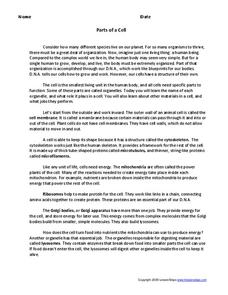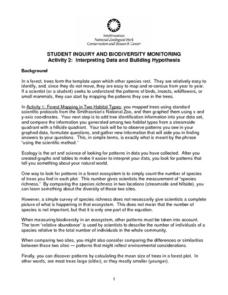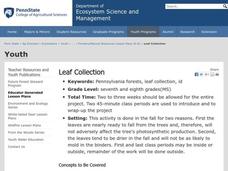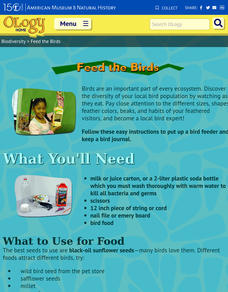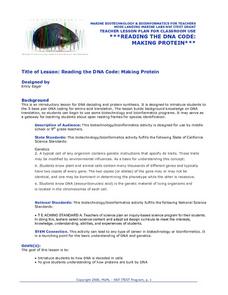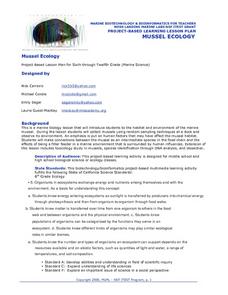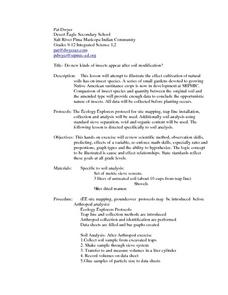Curated OER
Animal Signs
Students discuss the many different types of animal signs that can be used to identify and track animals. They participate in an hands-on activity in which they examine tracks, trails, homes, territory markings, and even "scat" left by...
NOAA
What's the Difference?
Due to the isolation of seamounts, their biodiversity offers a great deal of information on the development of biological and physical processes. Pupils use simple cluster analysis to rate the similarity and differences in biological...
Curated OER
Wildlife Track Identification
Even though the PowerPoint slides for this lesson are not included, you may find it useful for the wildlife track preservation instructions provided. After demonstrating the steps for making track casts, take your class outdoors to make...
Curated OER
Birds of Different Feathers: Species Specialization
Students identify differences in bird species and explain the concept of species specialization. They attain the knowledge that different birds occupy different habitats.
Students identify characteristics and features of birds that make...
Nuffield Foundation
Biodiversity in Your Backyard!
Take your enthusiastic ecologists outdoors to explore the biodiversity right in their own schoolyard! In preparing for this activity, it may be worthwhile to research websites with local flora to help in the plant identification...
Curated OER
Biodiversity
In this biodiversity learning exercise, learners sort and classify animals by their observable features using a dichotomous key. Students then respond to questions about complete and incomplete metamorphosis.
Curated OER
Our Forest is Changing
Young scholars read a story and solve a problem about an unhealthy population of trees. In this forest instructional activity students study tree disease and then research it online and present what they found.
Curated OER
Insect Monitoring
Students practice the scientific method in the classroom, either in preparation or as a substitution for real-world field experience. They examine a simulated biodiversity research situation, using a "mini-plot" or
sampling square...
Curated OER
Tree Identification
Learners are introduced to the characteristics of trees and different techniques to identify them. They distinguish between a deciduous and a coniferous tree. Students describe at least four characteristics used to identify trees. They...
Curated OER
Pond Life Identification Kit
Young scholars explore ecology and biodiversty. They use the wet-mount procedure to make several slides to view using the microscope and draw what they see.
Chicago Botanic Garden
Preparing for Project BudBurst
Plants take cues from the environment—change in daylight hours and temperature—to complete their seasonal life cycles. Lesson four in the series of six has classes collect phenology data on plants. After taking initial observations,...
Curated OER
Parts of a Cell
Simplify the parts of a cell with this handout and brief activity. Learners read a two-page explanation of the parts of a cell that includes bolded vocabulary words. Using what they have just read, class members answer 19...
Curated OER
Benthic Macroinvertebrates
Students survey and describe a stream ecosystem. They sample the benthic macroinvertebrate populations of a given stream and determine community structure through the use of the Chandler Index and a species diversity index.
Curated OER
Interpreting Data and Building Hypothesis
High schoolers define the term species, and graph species data together with previously collected data at the National Zoo. They interpret graphed data and recognize patterns in the streamside quadrant versus hillside quadrant. Students...
Chicago Botanic Garden
Leaf Litter Ecology Lab
Some organisms spend their entire lives in leaf litter. The third in a series of six is a great instructional activity exploring the community of leaf litter. Groups gather and then spread leaf litter over white paper and remove...
Curated OER
Create a Field Guide of Local Plants
High schoolers become familiar with making herbarium specimens as well as utilizing field guides to help identify the species which they gather. They use their herbarium collection to create personalized field guides with plants in...
Curated OER
Leaf Collection
Learners examine the tree species in Pennsylvania. In this Pennsylvania tree lesson students use field guides to assist them in identifying tree species.
Curated OER
Marshland Ecosystem
Students classify animals based on their physical characteristics and eating habits. In this animal identification lesson plan, students investigate the life forms shown on a Parisian ceramic basin, and discover ecosystem the...
American Museum of Natural History
Feed the Birds
What kinds of birds are common in the area? Young scientists use household supplies to create bird feeders. They then document the birds that come to their feeders by keeping journals.
Curated OER
Hide and Seek Science
Students examine macro-invertebrates in order to better understand their link to the food web. Working in groups, they record observations of several areas of a stream or river, collect samples from the river bottom, and identify the...
Curated OER
Create a Dichotomous Key of Idaho Reptiles
Students use the reptile section of the Digital Atlas of Idaho. They make a dichotomous key and decide on what defining characteristics they can use to distinguish between species. They hone their observation skills and recognize...
Curated OER
Reading the Dna Code: Making Protein
Students study DNA decoding and protein synthesis. They use the amino acid table to translate DNA, break DNA strands into three nucleotide codes, and translate nucleotides into amino acid protein codes. They research the importance of...
Curated OER
Mussel Ecology
Students are introduced to the marine environment of the mussel. The emphasis of the lesson is upon what human factors are present to influence the environment in positive and negative ways. They brainstorm in groups in order to conduct...
Curated OER
Do new kinds of insects appear after soil modification?
Students explore and experiment with the concept do new kinds of insects appear after soil modification. They assess and review scientific methods of observation, predicting, variables, math skills, ratio, proportions, graphs and the art...











